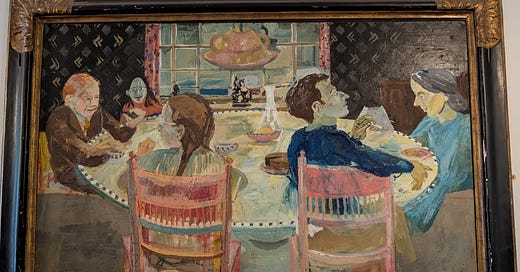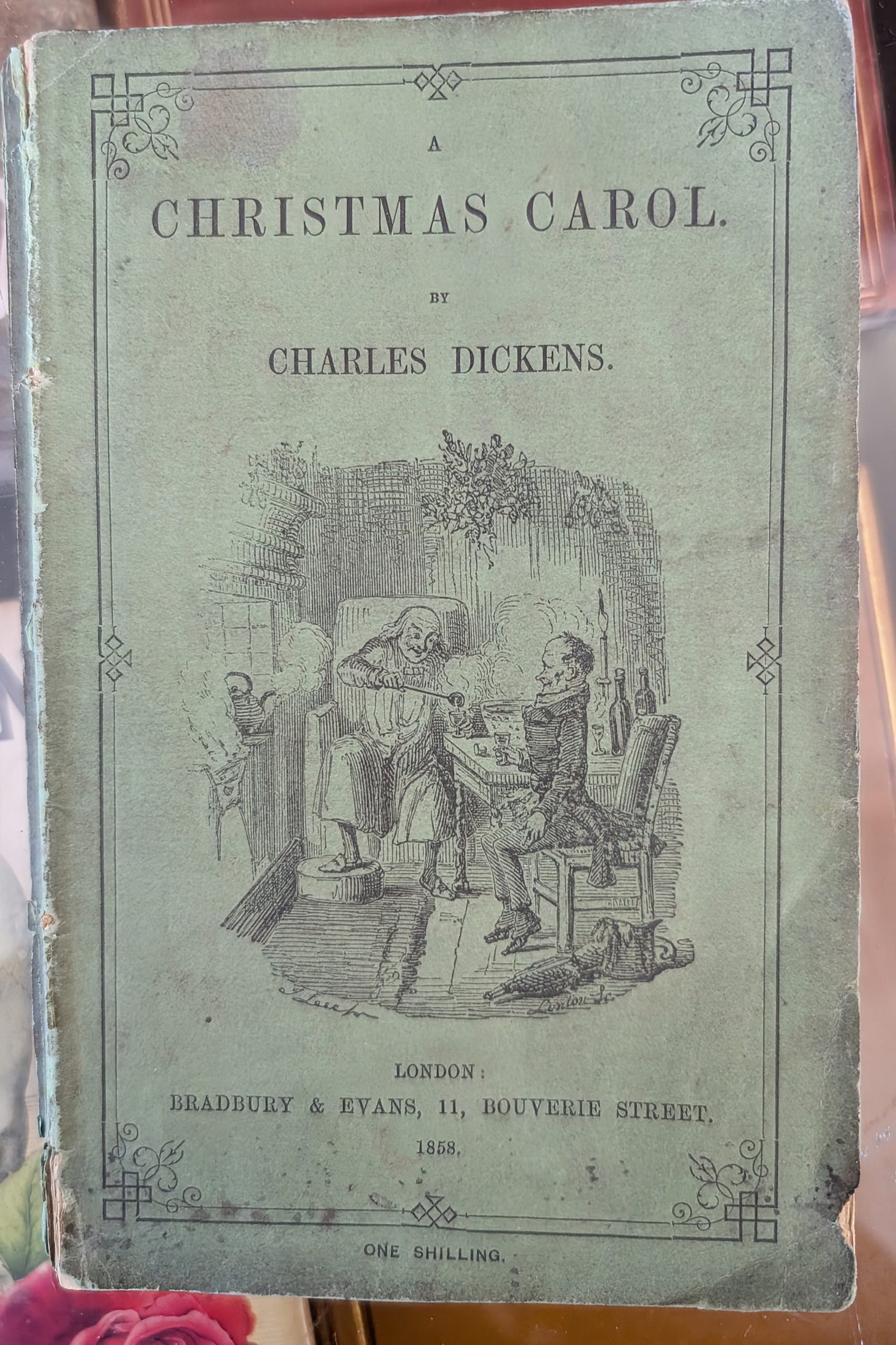Saturday morning. From the railway station in Lewes I hurried up the hill to the town hall. In I went through the side entrance on Fisher Street, past Nerissa Garnett’s oil painting depicting her family at the Charleston dining table. A short queue and I was in – in, that is, to the last Lewes book fair of the year (the last of five, but I’ve missed all the others), just after opening time.
Lewes book fair wasn’t going to be the grand Firsts or the stylish Chelsea Rare Book Fair, I knew. At first glance it felt more like an outsize jumble sale. I’m not sure what I was hoping I would find there (beyond that elusive title, foolishly priced far below its true value, etc). The first thing I saw, though, was not far off a scene from Ben Wheatley’s Generation Z, a “darkly comic, outlandishly gory, zombie-horror satire”. Only the prey here was made of paper and ink rather than flesh and blood.
Immediately opposite the door into the main hall, where all the action was, a crowd jostled to get at a row of bookshelves. Eldritch groans filled the air as they lumbered into one another, and tugged feverishly at the precious volumes. These were books, I saw, marked to sell for £3 each in the morning – stock being offloaded to make room for more. The price would later drop to £2, then £1. By which time anything that happened to look interesting would no doubt long have gone.
I plotted a course around the mayhem, but of course that didn’t save me from the swipe of the zombie. The book-collecting variety of the species (I say, hypocritically) turns out to be rather a selfish lot. They will happily reach across you, bat you aside, or knock you down with a backpack in their mad hunger for slightly tatty histories of the Napoleonic Wars or a third-rate thriller. They came for the esoterica (Aleister Crowley, H. R. Wakefield’s ghost stories) and stayed for the table laden with packed boxes of old postcards. They then retreated to the café area (“Refreshments are available and held in high regard”, saith the website) to sit in a daze until ready for another sortie.
I took refuge in browsing a tall bookcase of mid-century shockers (much Dennis Wheatley and almost as much James Hadley Chase) but lingered too long: the bookcase’s owner came round and engaged me in friendly chat until eventually he felt like letting me go. It was decent of him. As well as his life story (and very colourful it was, too), I learnt a little bit about the trade from his perspective: buying boxes of books at auction, in ignorance about whether they would be worth the candle or not, stumbling on the occasional discovery, letting a discovery get away, making a profit of £5 on a £10 sale, filling up the house with 15,000 books . . . We were blocking the way, though, and inviting the hordes to barge into us at will. The effect was somewhat fluvial. I say he let me go but really I was swept away with the current as he clung to his corner.
I became quite walking-dead-ish myself, which had its benefits. Standing my ground, for example, put me in front of a shelf marked “speculative fiction / future war novels”. There were plenty of titles here that were unfamiliar to me, amid the more obvious ones. Besides The Coming Waterloo and The North Sea Bubble, one of the slimmer, scarcer volumes was called How John Bull Lost London by “Grip”, offered for £95, a tale of the French taking the city by way of a Channel tunnel:
And so we all lumbered around the hall together. Eventually, I got round to some very good-looking copies of Patricia Highsmith and Vladimir Nabokov, not to mention Charles Dickens –
– only to realize that these belonged to a dealer I know well and could track to his lair/shop any time I liked.
All of which is to say, dear reader, that I went to Lewes the other day, inspected some forty bookstalls, weighed up various volumes without feeling that any of them exactly sparked joy, departed feeling obscurely thwarted (but de-zombiefied), then visited two bookshops on the High Street (the high-toned Bow Windows and the careworn Fifteenth Century Bookshop), yet still left with – nothing.
The inevitable postscript to this shaggy dog story: on the way home I remembered that there is an Oxfam Bookshop at Herne Hill I hadn’t visited for a long time.
They had some books I very much wanted . . .
*
Months of failing to publish anything on Bibliomania and I come back with this farcical outburst of Pooterism? Shame on me. But more to the point: thanks for reading, if you’re still reading; and there’ll be more to come soon, I hope, on less whimsical matters. If you’ve stumbled on some great books and feel like boasting about them, please boast away in the comments.
*
ICYMI: In the autumn issue of the Book Collector Greta Mazurkevičienė tells the story of “ab”, the underground Lithuanian printing house. The Beinecke Rare Book and Manuscript Library sends its damaged books to 344 Winchester Avenue. Eighteenth-century publishers’ wrappers looked like this.








Don’t apologise for not writing anything on Substack for some time. Most people write too much here, contributing to the word-swirl that surrounds us. I’m a more humdrum bibliophile myself but I enjoy your excursions. Talking of Sussex, is that extraordinary bookshop at Eastbourne still there where books are so tightly stacked that some of them can no longer be seen?
Re your invasion war novel encounters, I imagine at some point the dealer would have been offering the rare 1871 6penny pamphlet novella that kickstarted the whole genre, The Battle of Dorking. Sold 100,000 copies in first 3 months of publication, caused a storm and launched a whole new area of fiction. Worth a read!